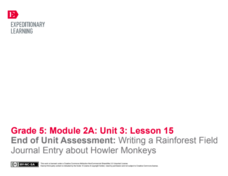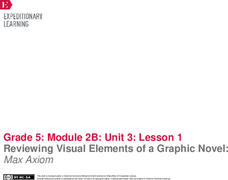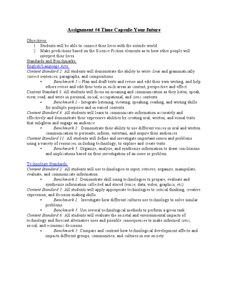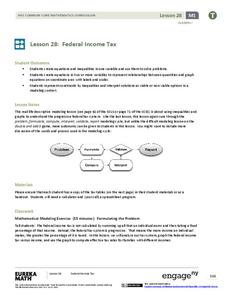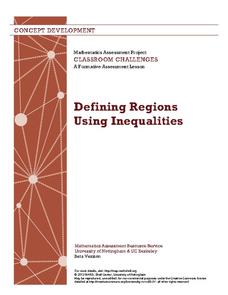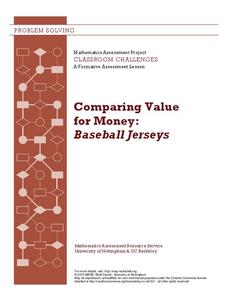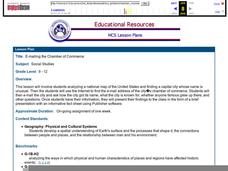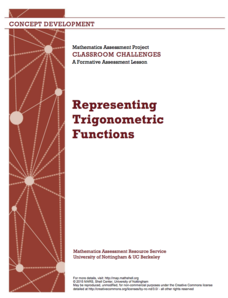EngageNY
End of Unit Assessment: Writing a Rainforest Field Journal Entry about Howler Monkeys
Give me more details. Scholars complete an end of unit assessment by creating an information text box to go with their field journal entries about howler monkeys. Learners use the class time to work independently.
EngageNY
Reviewing Visual Elements of a Graphic Novel: Max Axiom
Pass the tea! Using the resource, scholars participate in a Tea Party protocol to analyze text and images about inventions that helped meet societal demands. After sharing their observations with each other, they discuss visual elements...
EngageNY
Mid-Unit 3 Assessment, Part I: Short Constructed Response and Organizing Notes for a Public Speech
It's time to put pen to paper. Scholars complete the first part of the mid-unit 3 assessment, writing a short constructed response about international aid following a natural disaster. Next, pupils use informational texts and note...
EngageNY
Mid-Unit 3 Assessment, Part II: Organizing Notes for a Public Speech
It's all a matter of opinion! Pupils take Part II of the mid-unit assessment, in which they continue organizing their notes in preparation for writing an opinion speech. Using the resource, they add reasons, evidence, and a concluding...
Curated OER
Assignment #4 Time Capsule-Your Future
Class members create a PowerPoint presentation showing artifacts they would include in a time capsule. The artifacts and explanations reflect personal hobbies, grooming choices, school life, etc. A great way for class members to...
EngageNY
Federal Income Tax
Introduce your class to the federal tax system through an algebraic lens. This resource asks pupils to examine the variable structure of the tax system based on income. Young accountants use equations, expressions, and inequalities to...
EngageNY
Using Linear Models in a Data Context
Practice using linear models to answer a question of interest. The 12th installment of a 16-part module combines many of the skills from previous lessons. It has scholars draw scatter plots and trend lines, develop linear models, and...
MARS, Shell Center, University of Nottingham
Defining Regions Using Inequalities
Your young graphers will collaboratively play their way to a better understanding of the solution set produced by the combining of inequalities. Cooperation and communication are emphasized by the teacher asking questions to guide the...
Curated OER
Comparing Value for Money: Baseball Jerseys
Learners step up to the plate as they first complete an assessment task using linear equations to determine the best company from which to buy baseball jerseys. They then evaluate provided sample responses identifying strengths and...
Mathematics Assessment Project
Representing Inequalities Graphically
A new, improved version of the game Battleship? Learners graph linear inequalities on the coordinate plane, then participate in a game where they have to guess coordinate points based on the solution to a system of linear inequalities in...
Curated OER
Survival in Antarctica
Explore the harsh climate of Antarctica and its wildlife. Participate in experiments to determine how humans survive in the continent's climate, and address the difficulties faced by scientists.
EngageNY
Sine and Cosine of Complementary Angles and Special Angles
Building trigonometric basics here will last a mathematical lifetime. Learners expand on the previous instructional activity in a 36-part series by examining relationships between the sine and cosine of complementary angles. They also...
Mathematics Assessment Project
Representing Probabilities: Medical Testing
Test probability concepts with an activity that asks pupils to first complete a task investigating false positive in medical testing and then to evaluate sample responses to the same task.
Mathematics Assessment Project
Discovering the Pythagorean Theorem
Young mathematicians join the ancient order of the Pythagoreans by completing an assessment task that asks them to find the area of tilted squares on dot paper. They then look at patterns in the squares to develop the Pythagorean Theorem.
EngageNY
Graphing Quadratic Functions from Factored Form
How do you graph a quadratic function efficiently? Explore graphing quadratic functions by writing in intercept form with a lesson that makes a strong connection to the symmetry of the graph and its key features before individuals write...
EngageNY
Least Common Multiple and Greatest Common Factor
Find the common denominator between prime factors, factor trees, and the distributive property. Scholars learn to find the least common multiple and greatest common factor of pairs of numbers. They rotate through stations to connect...
Curated OER
E-mailing the Chamber of Commerce
Encourage effective internet research and e-mail correspondence as scholars investigate a US capital city they've never visited to find pertinent and relevant information. They begin by picking a city, then visit that city's chamber of...
Curated OER
Cultural Environment during the Great Depression
Eleventh graders research American culture of the Great Depression. In this role-playing instructional activity, groups of students develop "talking points" for their assigned topic and condense them into a Powerpoint or Hyper Studio...
J. Paul Getty Trust
Shaping Ideas: Symbolism in Sculpture—Lesson 2
Young artists create a series of sketches of ideas for a sculpture, and using the criteria develop in the previous class, critique their sketches. They then choose one of their ideas and create their work of art.
Curated OER
Mission to Mars
Students consider the affects of space travel on the human body. In this human physiology lesson, students compare how the 5 different body systems work on Earth and in Space. Students then design a product that an astronaut could use as...
Mathematics Assessment Project
Representing Trigonometric Functions
Discover the classic example of periodicity: Ferris wheels. Young mathematicians learn about trigonometric functions through Ferris wheels. They match functions to their graphs and relate the functions to the context.
Digital Forsyth
Restoration Project
In need of a neat idea that incorporates technology skills, art, and history? Young art historians will each select an old photograph from a local archive to digitally restore. The primary focus is to add color, clarity, and remake the...
Dream of a Nation
Big6 Research Project
Do research projects at your school look like a class of eighth graders staring at a blank screen? Use the Big 6 research method to guide middle schoolers through the process of finding a topic, searching for and evaluating sources,...
EngageNY
The Angle-Angle (AA) Criterion for Two Triangles to Be Similar
What do you need to prove triangles are similar? Learners answer this question through a construction exploration. Once they establish the criteria, they use the congruence and proportionality properties of similar objects to find...


